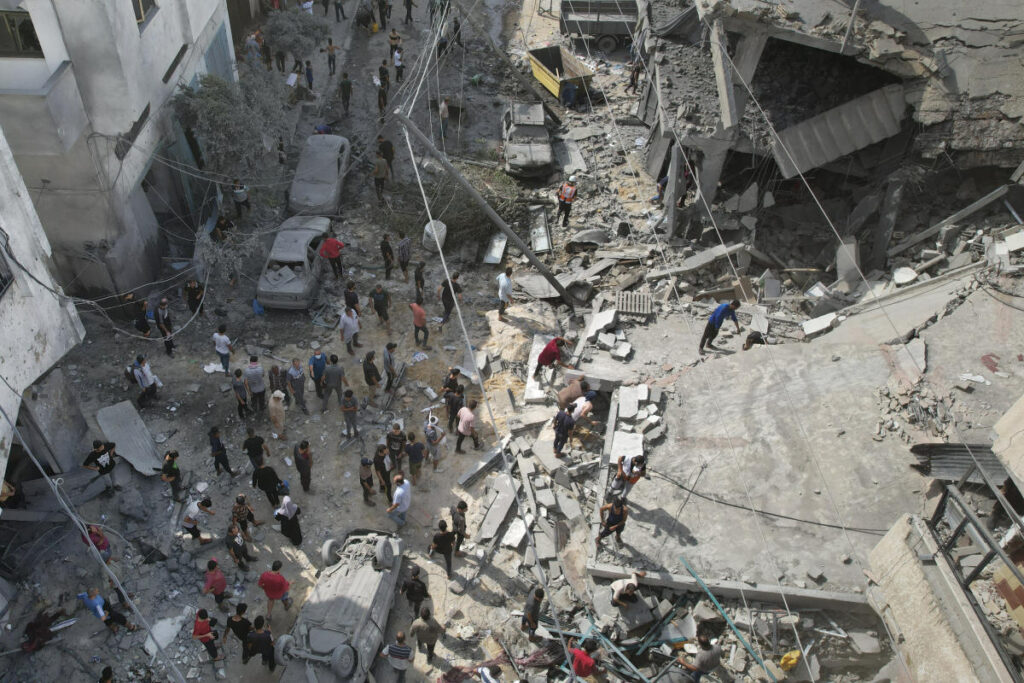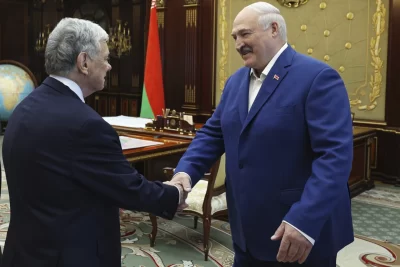
Israeli warplanes struck targets across Gaza overnight and into Sunday, as well as two airports in Syria and a mosque in the occupied West Bank allegedly used by militants, as the 2-week-old war with Hamas threatened to spiral into a broader conflict.
Israel has traded fire with Lebanon’s Hezbollah militant group on a near-daily basis since the war began, and tensions are soaring in the Israeli-occupied West Bank, where Israeli forces have battled militants in refugee camps and carried out two airstrikes in recent days.
Israeli Prime Minister Benjamin Netanyahu told troops in northern Israel that if Hezbollah launches a war against Israel, “it will make the mistake of its life. We will cripple it with a force it cannot even imagine and the consequences for it and the Lebanese state will be devastating.”
For days, Israel has seemed to be on the verge of launching a ground offensive in Gaza as part of its response to Hamas’ deadly Oct. 7 rampage. Tanks and tens of thousands of troops have massed at the border, and Israeli leaders have spoken of an undefined next stage in operations.
A convoy of 17 aid trucks was allowed to enter Gaza from Egypt on Sunday, Egypt’s state-run media reported, the second shipment into the territory since Israel imposed a complete siege two weeks ago. On Saturday, 20 trucks entered. Associated Press journalists at the crossing saw seven fuel trucks enter Gaza on Sunday, but did not see any more deliveries.
The Israeli military said the humanitarian situation was “under control,” as OCHA called for 100 trucks a day to enter.
Israel repeated its calls for people to leave northern Gaza, including by dropping leaflets from the air. It says an estimated 700,000 have already fled, but hundreds of thousands remain. That would raise the risk of mass civilian casualties in any ground offensive.
Israeli military officials say Hamas’ infrastructure and underground tunnel system are concentrated in Gaza City, in the north, and that the next stage of the offensive will include unprecedented force there. Israel says it wants to crush Hamas, but officials have also spoken of carving out a possible buffer zone to keep Palestinians from approaching the border.
Hospitals packed with patients and displaced people are running low on medical supplies and fuel for generators, forcing doctors to perform surgeries with sewing needles, using vinegar as disinfectant, and without anesthesia.
The World Health Organization says at least 130 premature babies are at “grave risk” because of a shortage of generator fuel. It said seven hospitals in northern Gaza have been forced to shut down due to damage from strikes, lack of power and supplies, or Israeli evacuation orders.
Shortages in critical supplies, including ventilators, are forcing doctors to ration treatment, said Dr. Mohammed Qandeel, who works in Khan Younis’ Nasser Hospital. Dozens of patients continue to arrive and are treated in crowded, darkened corridors, as hospitals preserve electricity for intensive care units.
“It’s heartbreaking,” Qandeel told the AP. “Everyday, if we receive 10 severely injured patients we have to manage with maybe three or five ICU beds available.”
Palestinians sheltering in U.N.-run schools and tent camps are running low on food and drinking dirty water. A power blackout has crippled water and sanitation systems. OCHA said cases of chickenpox, scabies and diarrhea are on the rise because of the lack of clean water.
Heavy airstrikes were reported across Gaza, including in the southern part of the coastal strip, where Israel has told civilians to seek refuge. At the Al-Aqsa hospital in Deir al-Balah, south of the evacuation line, several bodies wrapped in white shrouds were lined up outside on the ground.
Khalil al-Degran, a hospital official, said more than 90 bodies had been brought in since early Sunday, as the sound of nearby bombing echoed behind him. He said 180 wounded people had arrived, mostly children, women and the elderly who had been displaced from other areas.




